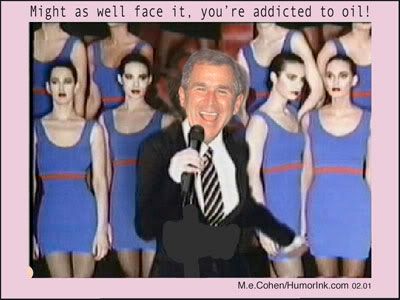D
dan e 1980
Guest
Bush: U.S. Must Get Free *of* Mideast Oil
By TERENCE HUNT, AP White House Correspondent 2 minutes ago
WASHINGTON - A politically weakened
President Bush declared Tuesday night that America must break its long dependence on Mideast oil and rebuked critics of his stay-the-course strategy for the unpopular war in
Iraq.
"America is addicted to oil, which is often imported from unstable parts of the world," Bush said as he sought to drive the election-year agenda in his annual State of the Union address.
Rejecting calls for the withdrawal of troops from Iraq, Bush said, "There is no peace in retreat." He also slapped at those who complain he took the country to war on the erroneous grounds that Iraq possessed weapons of mass destruction.
"Hindsight alone is not wisdom," Bush said. "And second-guessing is not a strategy."
In an unscripted moment, anti-war activist Cindy Sheehan, the mother of a fallen soldier in Iraq, was taken into custody by police in the House gallery just before Bush spoke to a joint session of Congress. She was escorted from the visitors gallery after she caused a disruption, a Capitol Police official said.
With Congress facing midterm elections in November, there was a partisan mood in the chamber as Bush, hampered by big budget deficits, offered a modest program.
Democrats stood and cheered when Bush said that Congress did not act a year ago "on my proposal to save
Social Security." Bush got a bemused look on his face, shook his finger and continued, "yet the rising cost of entitlements is a problem that is not going away."
Switching gears, Bush asked lawmakers to join him in naming a commission to examine the impact of Baby Boom retirements on Social Security, Medicare and Medicaid spending.
He declared that the "the state of our union is strong" despite Americans' anxieties about the war in Iraq, the economy and soaring energy costs. Oil prices are inching toward $70 a barrel, throwing a cloud over the economy and pinching Americans' pocketbooks.
Bush called for increased federal research into alternative fuels such as ethanol made from weeds or wood chips instead of corn.
Bush's address came amid a changing of the guard elsewhere in Washington. Conservative judge
Samuel Alito was sworn in as a new Supreme Court justice, replacing
Sandra Day O'Connor, who has been a moderate swing vote. The Senate also confirmed Ben Bernanke to be chairman of the
Federal Reserve, replacing
Alan Greenspan after 18 1/2 years in the influential job.
Alito was in the House chamber, alongside new Chief Justice John Roberts, another Bush nominee, and Justices
Stephen Breyer and
Clarence Thomas. The president was applauded 58 times in a speech that ran slightly more than 50 minutes.
Facing budget deficits that may approach or exceed $400 billion this year, Bush had no room for expensive, new initiatives.
But Bush did call for greater public spending on basic science research and more money for math and science education.
He proposed an initiative to train 70,000 high school teachers to lead advanced-placement courses in math and science. In addition, he urged bringing 30,000 math and science professionals into the classrooms to teach.
"We need to encourage children to take more math and science and make sure those courses are rigorous enough to compete with other nations," the president said.
Bush went before the nation after the toughest year of his administration. His job approval rating is in the anemic high 30s to low 40s.
Health care is a priority for both parties, particularly since nearly 46 million Americans lack insurance. Democrats say that in 2005 alone, the number of uninsured grew by nearly a million.
"Keeping American competitive requires affordable health care," the president said.
Bush proposed greater tax benefits for health saving accounts, the high-deductible health care plan that allows people to contribute money tax-free to 401(k)-like health savings plans, as a way to expand their use. He said lawmakers also must allow workers to take the coverage with them as they change jobs.
Many Republicans cheered Bush when he defended his program of surveillance in the United States without warrants to combat terrorism — a program whose legality has been challenged by members of both parties. "This terrorist surveillance program has helped prevent terrorist attacks," the president said.
As he has in every State of the Union address to some extent, Bush said the United States must curb its reliance on foreign oil imports.
He called for more research on batteries for hybrid and electric cars and work on alternative fuels.
"Our goal is to make this new kind of ethanol practical and competitive within six years," the president said. "Breakthroughs on this and other new technologies will help us reach another great goal: to replace more than 75 percent of our oil imports from the Middle East by 2025.
By targeting only Mideast oil, Bush was ignoring the largest sources of American petroleum consumption — Mexico and Canada. Imports of oil and refined product from the Persian Gulf make up less than a fifth of all imports and 11 percent of total consumption, according to Energy Department statistics.
Virginia Gov. Timothy M. Kaine, chosen to deliver the response for the Democrats, scolded Bush on the soaring national debt, the frustrated effort to rebuild the hurricane-battered Gulf Coast, Medicaid cuts and other issues. On Iraq, Kaine said that Americans were given "inaccurate information about the reasons for invading" and that troops were given body armor that was inadequate.
"The federal government should serve the American people," the newly elected governor said. "But that mission is frustrated by this administration's poor choices and bad management.
Bush divided his address between problems at home and abroad.
With the war in Iraq about to enter its fourth year and more than 2,240 American troops killed, Bush said the nation must not falter in what he called the central front in the war on terror. Bush did not offer any timetable for bringing American troops home from Iraq. There are about 138,000 U.S. troops in Iraq, down from about 160,000 at the time of the January elections.
Despite recent elections in Iraq, Lebanon and the Palestinian territories that have given rise to religious-based parties with views sometimes hostile to the West, Bush pressed Saudi Arabia and Egypt — longtime allies that Washington is loath to challenge too aggressively — to provide greater freedoms to their citizens.
He urged Hamas to "recognize
Israel, disarm, reject terrorism and work for lasting peace."
Bush said the United States and its allies were united in insisting that
Iran not develop nuclear weapons. Speaking directly to the Iranian people, Bush looked toward a different future for their country and said the United States "hopes one day to be the closest of friends with a free and democratic Iran."
The president renewed his oft-stated goal for Congress to make permanent the tax cuts enacted during his presidency.
"If we do nothing, American families will face a massive tax increase they do not expect and will not welcome," he said.
_______________________________________________
bush later concluded that to fulfill his plan for america becoming non-dependant on mid-east oil, the middle east will become annexed as part of the united states. he said "if we'd PWONED the middle eats, then we is not dependancy on thems".
:eek
By TERENCE HUNT, AP White House Correspondent 2 minutes ago
WASHINGTON - A politically weakened
President Bush declared Tuesday night that America must break its long dependence on Mideast oil and rebuked critics of his stay-the-course strategy for the unpopular war in
Iraq.
"America is addicted to oil, which is often imported from unstable parts of the world," Bush said as he sought to drive the election-year agenda in his annual State of the Union address.
Rejecting calls for the withdrawal of troops from Iraq, Bush said, "There is no peace in retreat." He also slapped at those who complain he took the country to war on the erroneous grounds that Iraq possessed weapons of mass destruction.
"Hindsight alone is not wisdom," Bush said. "And second-guessing is not a strategy."
In an unscripted moment, anti-war activist Cindy Sheehan, the mother of a fallen soldier in Iraq, was taken into custody by police in the House gallery just before Bush spoke to a joint session of Congress. She was escorted from the visitors gallery after she caused a disruption, a Capitol Police official said.
With Congress facing midterm elections in November, there was a partisan mood in the chamber as Bush, hampered by big budget deficits, offered a modest program.
Democrats stood and cheered when Bush said that Congress did not act a year ago "on my proposal to save
Social Security." Bush got a bemused look on his face, shook his finger and continued, "yet the rising cost of entitlements is a problem that is not going away."
Switching gears, Bush asked lawmakers to join him in naming a commission to examine the impact of Baby Boom retirements on Social Security, Medicare and Medicaid spending.
He declared that the "the state of our union is strong" despite Americans' anxieties about the war in Iraq, the economy and soaring energy costs. Oil prices are inching toward $70 a barrel, throwing a cloud over the economy and pinching Americans' pocketbooks.
Bush called for increased federal research into alternative fuels such as ethanol made from weeds or wood chips instead of corn.
Bush's address came amid a changing of the guard elsewhere in Washington. Conservative judge
Samuel Alito was sworn in as a new Supreme Court justice, replacing
Sandra Day O'Connor, who has been a moderate swing vote. The Senate also confirmed Ben Bernanke to be chairman of the
Federal Reserve, replacing
Alan Greenspan after 18 1/2 years in the influential job.
Alito was in the House chamber, alongside new Chief Justice John Roberts, another Bush nominee, and Justices
Stephen Breyer and
Clarence Thomas. The president was applauded 58 times in a speech that ran slightly more than 50 minutes.
Facing budget deficits that may approach or exceed $400 billion this year, Bush had no room for expensive, new initiatives.
But Bush did call for greater public spending on basic science research and more money for math and science education.
He proposed an initiative to train 70,000 high school teachers to lead advanced-placement courses in math and science. In addition, he urged bringing 30,000 math and science professionals into the classrooms to teach.
"We need to encourage children to take more math and science and make sure those courses are rigorous enough to compete with other nations," the president said.
Bush went before the nation after the toughest year of his administration. His job approval rating is in the anemic high 30s to low 40s.
Health care is a priority for both parties, particularly since nearly 46 million Americans lack insurance. Democrats say that in 2005 alone, the number of uninsured grew by nearly a million.
"Keeping American competitive requires affordable health care," the president said.
Bush proposed greater tax benefits for health saving accounts, the high-deductible health care plan that allows people to contribute money tax-free to 401(k)-like health savings plans, as a way to expand their use. He said lawmakers also must allow workers to take the coverage with them as they change jobs.
Many Republicans cheered Bush when he defended his program of surveillance in the United States without warrants to combat terrorism — a program whose legality has been challenged by members of both parties. "This terrorist surveillance program has helped prevent terrorist attacks," the president said.
As he has in every State of the Union address to some extent, Bush said the United States must curb its reliance on foreign oil imports.
He called for more research on batteries for hybrid and electric cars and work on alternative fuels.
"Our goal is to make this new kind of ethanol practical and competitive within six years," the president said. "Breakthroughs on this and other new technologies will help us reach another great goal: to replace more than 75 percent of our oil imports from the Middle East by 2025.
By targeting only Mideast oil, Bush was ignoring the largest sources of American petroleum consumption — Mexico and Canada. Imports of oil and refined product from the Persian Gulf make up less than a fifth of all imports and 11 percent of total consumption, according to Energy Department statistics.
Virginia Gov. Timothy M. Kaine, chosen to deliver the response for the Democrats, scolded Bush on the soaring national debt, the frustrated effort to rebuild the hurricane-battered Gulf Coast, Medicaid cuts and other issues. On Iraq, Kaine said that Americans were given "inaccurate information about the reasons for invading" and that troops were given body armor that was inadequate.
"The federal government should serve the American people," the newly elected governor said. "But that mission is frustrated by this administration's poor choices and bad management.
Bush divided his address between problems at home and abroad.
With the war in Iraq about to enter its fourth year and more than 2,240 American troops killed, Bush said the nation must not falter in what he called the central front in the war on terror. Bush did not offer any timetable for bringing American troops home from Iraq. There are about 138,000 U.S. troops in Iraq, down from about 160,000 at the time of the January elections.
Despite recent elections in Iraq, Lebanon and the Palestinian territories that have given rise to religious-based parties with views sometimes hostile to the West, Bush pressed Saudi Arabia and Egypt — longtime allies that Washington is loath to challenge too aggressively — to provide greater freedoms to their citizens.
He urged Hamas to "recognize
Israel, disarm, reject terrorism and work for lasting peace."
Bush said the United States and its allies were united in insisting that
Iran not develop nuclear weapons. Speaking directly to the Iranian people, Bush looked toward a different future for their country and said the United States "hopes one day to be the closest of friends with a free and democratic Iran."
The president renewed his oft-stated goal for Congress to make permanent the tax cuts enacted during his presidency.
"If we do nothing, American families will face a massive tax increase they do not expect and will not welcome," he said.
_______________________________________________
bush later concluded that to fulfill his plan for america becoming non-dependant on mid-east oil, the middle east will become annexed as part of the united states. he said "if we'd PWONED the middle eats, then we is not dependancy on thems".
:eek





